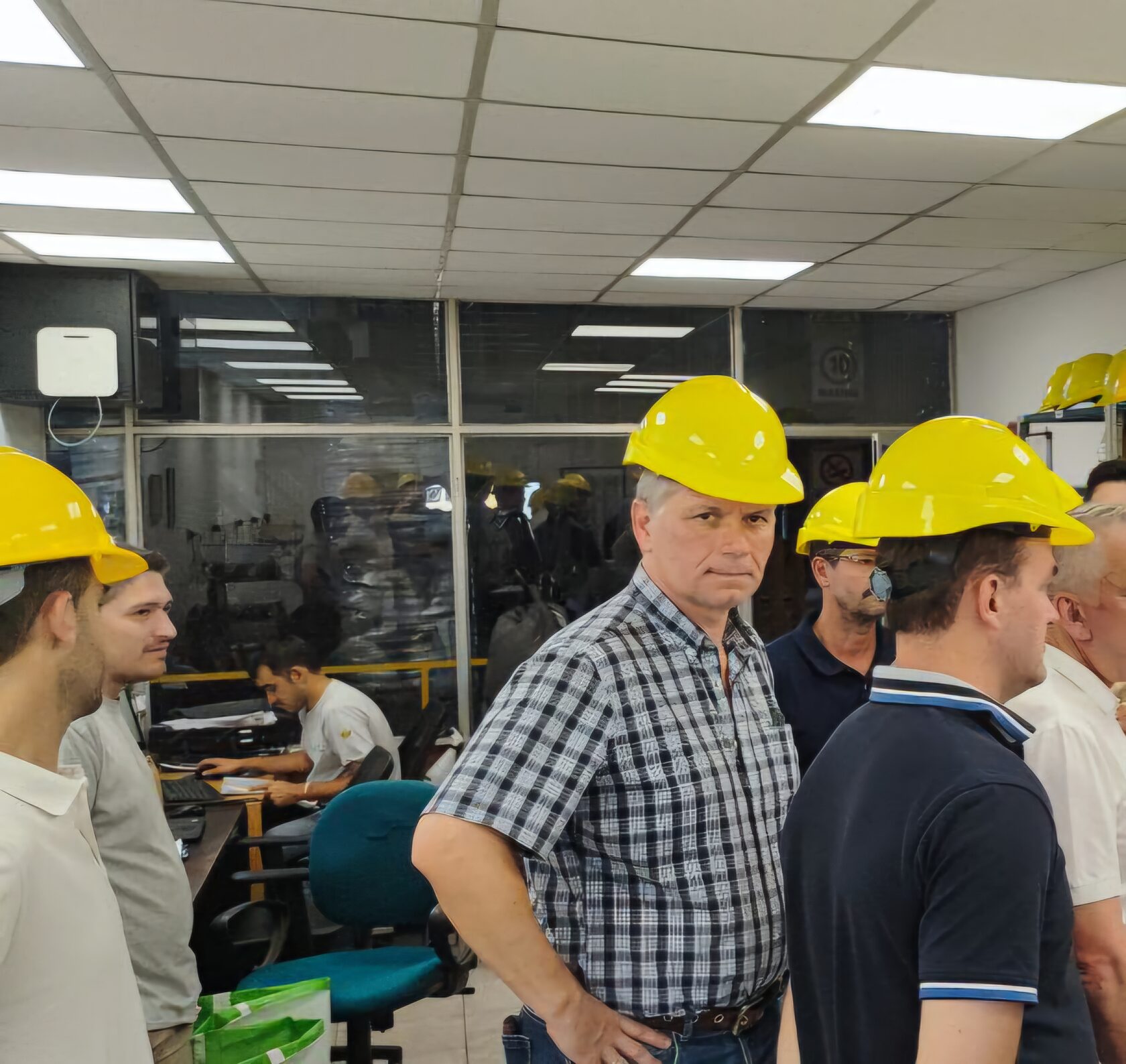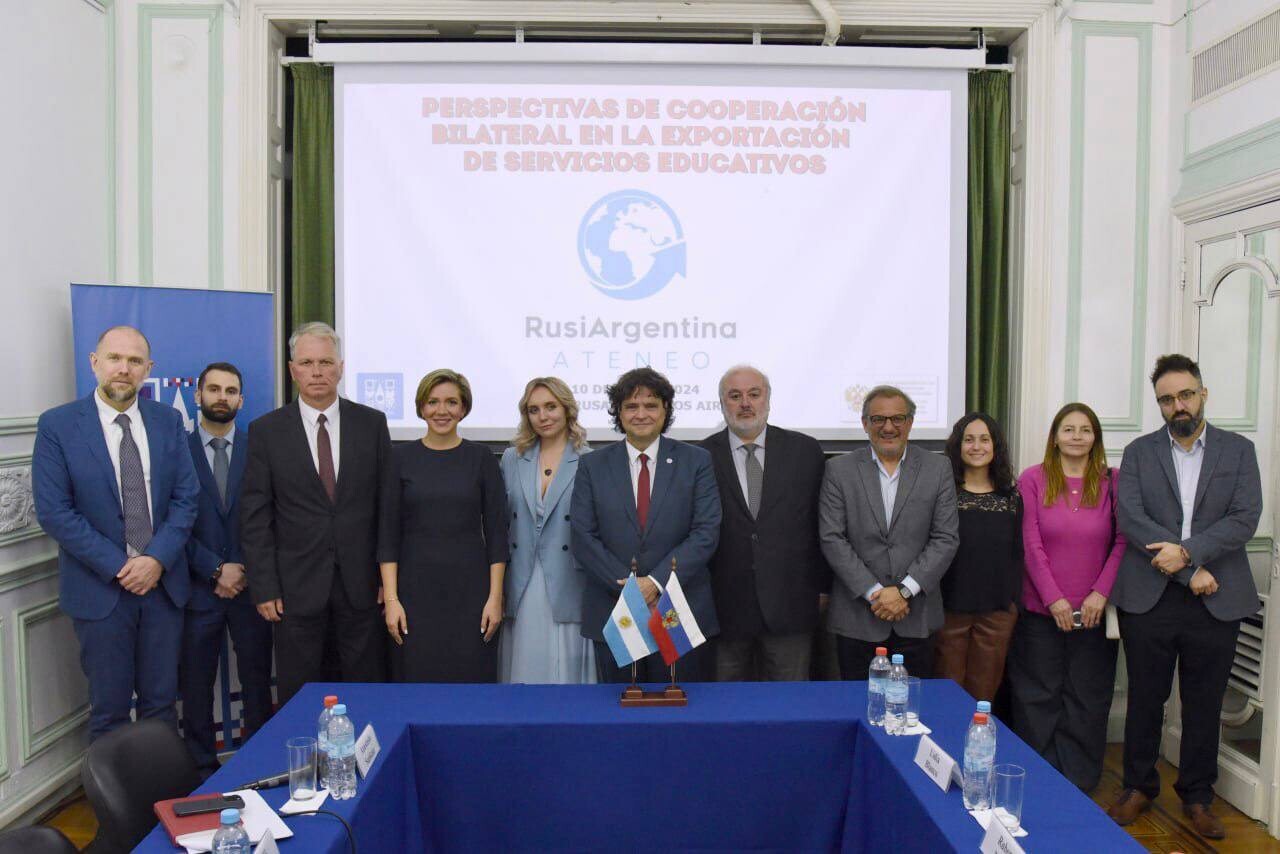Vitaly Kondratenko,
Trade Representative of the Russian Federation in Argentina
Trade Representative of the Russian Federation in Argentina
Foreign trade relations and industrial cooperation be tween Russia and the Argentine Republic is a primary focus of the Russian Trade Representation in Argentina.
Foreign trade relations and industrial cooperation be tween Russia and the Argentine Republic is a primary focus of the Russian Trade Representation in Argentina. In 2018, Russia’s President and his counterpart agreed to further advance their comprehensive strategic part nership, stressing the importance of expanding bilat eral trade, economic and investment cooperation. They reiterated their commitment to strengthen ties between the business communities of our countries, develop bi lateral trade, and increase the share of high value-add ed products.
In 2018, Russia’s President and his counterpart agreed to further advance their comprehensive strategic part nership, stressing the importance of expanding bilat eral trade, economic and investment cooperation. They reiterated their commitment to strengthen ties between the business communities of our countries, develop bi lateral trade, and increase the share of high value-added products.
Argentina’s economy
The Argentine Republic is one of the largest and most densely populated countries in South America. With a territory spanning 2.8 million square kilometers, it is home to over 46 million people. The country boasts rich natural resources and a favourable climate, which contribute to the development of its national economy.
Argentina is an industrial-agrarian nation, which fully meets its food needs and is one of the world’s largest exporters of agricultural products. Its traditionally developed food industry, closely linked to agriculture, is based on abundant and diverse raw materials. The agro-industrial complex plays a pivotal role in the country’s economy, providing the main inflow of foreign currency. Among the most cutting-edge sectors are the automative industry, agricultural machinery, pharmaceuticals, metallurgy, as well as chemical, petrochemical, radio-electronic, and light industries.
The Republic ranks 4th in the world in shale oil reserves and 2nd in shale gas stocks. Together with Bolivia and Chile, the country forms the so-called “lithium triangle,” which accounts for approximately 56 % of the world’s lithium reserves. Argentina ranks 4th in production volume among countries mining this rare earth metal. However, its potential for mineral extraction remains largely untapped.
Argentina’s economy is considered the third largest in Latin America (after Brazil and Mexico) in terms of GDP, which currently stands at some USD 655 billion.
In 2023, its economy contracted by 1.6 %, primarily due to persistent macroeconomic imbalances and severe droughts, which led to a 26.7 % decline in agricultural production over the year. Some estimates foresee a 5 % economic growth in 2025, mostly thanks to investments in energy and a recovery in agricultural production, should the climate improve.
Argentina’s economy
The Argentine Republic is one of the largest and most densely populated countries in South America. With a territory spanning 2.8 million square kilometers, it is home to over 46 million people. The country boasts rich natural resources and a favourable climate, which contribute to the development of its national economy.
Argentina is an industrial-agrarian nation, which fully meets its food needs and is one of the world’s largest exporters of agricultural products. Its traditionally developed food industry, closely linked to agriculture, is based on abundant and diverse raw materials. The agro-industrial complex plays a pivotal role in the country’s economy, providing the main inflow of foreign currency. Among the most cutting-edge sectors are the automative industry, agricultural machinery, pharmaceuticals, metallurgy, as well as chemical, petrochemical, radio-electronic, and light industries.
The Republic ranks 4th in the world in shale oil reserves and 2nd in shale gas stocks. Together with Bolivia and Chile, the country forms the so-called “lithium triangle,” which accounts for approximately 56 % of the world’s lithium reserves. Argentina ranks 4th in production volume among countries mining this rare earth metal. However, its potential for mineral extraction remains largely untapped.
Argentina’s economy is considered the third largest in Latin America (after Brazil and Mexico) in terms of GDP, which currently stands at some USD 655 billion.
In 2023, its economy contracted by 1.6 %, primarily due to persistent macroeconomic imbalances and severe droughts, which led to a 26.7 % decline in agricultural production over the year. Some estimates foresee a 5 % economic growth in 2025, mostly thanks to investments in energy and a recovery in agricultural production, should the climate improve.

Barriers and Restrictions
Argentina imposes special additional requirements, conditions, or restrictions to oversee export-import operations for certain goods. Control is exercised through the licensing of imports and exports and the certification of goods to ensure they meet necessary requirements and standards. The Argentine market is one of the most protected in the world—besides the common custom duties for MERCOSUR countries, with a base rate of 35 %, imports are also subject to a statistical fee, consular fee, freight tax, and a contribution to the export development fund. In addition, exceptions may be applied to the custom duties to allow an increase in the rate for certain types of goods. Currency regulations require participants in foreign trade activities to sell their currency earnings and undergo strict control to obtain funds to pay for imported goods.
Russia-Argentina Cooperation
Argentine foreign trade statistics have it that in 2024, mineral fertilizers dominated Russia’s exports to Argentina, accounting for 78.46 % of total export in the first half of the year. A similar figure for synthetic rubber, rubber products, and related items stood at 9.9 %.
The main import goods from Argentina in the first half of 2024 were fruits and nuts (27 %), meat and edible offal (24 %), seeds and oilcakes (20 %), fish and shellfish (17 %), and dairy (7 %).
Despite the economic crisis in Argentina and the complex geopolitical situation, interactions among Russian-Argentine business communities continue to develop. The Trade Representation is arduously supporting the growth of Russian non-commodity, non-energy exports with high added value, specifically components for energy machinery, radio-electronics, chemicals, pharmaceuticals, and medical equipment.
The Russian Trade Representation in Argentina also supports Russian companies in implementing energy projects, including through Argentine representatives of the Parliamentary Friendship Group with Russia, Argentina’s Secretariat of Energy of the Ministry of Economy, and regional authorities. Today, with the assistance of the Trade Representation, major Russian companies and the province of Chubut (Comodoro Rivadavia) have signed MoUs for the construction and supply of components for a wind farm, and an agreement with the province of Neuquén for the construction of the Colomicó HPP.
Argentina imposes special additional requirements, conditions, or restrictions to oversee export-import operations for certain goods. Control is exercised through the licensing of imports and exports and the certification of goods to ensure they meet necessary requirements and standards. The Argentine market is one of the most protected in the world—besides the common custom duties for MERCOSUR countries, with a base rate of 35 %, imports are also subject to a statistical fee, consular fee, freight tax, and a contribution to the export development fund. In addition, exceptions may be applied to the custom duties to allow an increase in the rate for certain types of goods. Currency regulations require participants in foreign trade activities to sell their currency earnings and undergo strict control to obtain funds to pay for imported goods.
Russia-Argentina Cooperation
Argentine foreign trade statistics have it that in 2024, mineral fertilizers dominated Russia’s exports to Argentina, accounting for 78.46 % of total export in the first half of the year. A similar figure for synthetic rubber, rubber products, and related items stood at 9.9 %.
The main import goods from Argentina in the first half of 2024 were fruits and nuts (27 %), meat and edible offal (24 %), seeds and oilcakes (20 %), fish and shellfish (17 %), and dairy (7 %).
Despite the economic crisis in Argentina and the complex geopolitical situation, interactions among Russian-Argentine business communities continue to develop. The Trade Representation is arduously supporting the growth of Russian non-commodity, non-energy exports with high added value, specifically components for energy machinery, radio-electronics, chemicals, pharmaceuticals, and medical equipment.
The Russian Trade Representation in Argentina also supports Russian companies in implementing energy projects, including through Argentine representatives of the Parliamentary Friendship Group with Russia, Argentina’s Secretariat of Energy of the Ministry of Economy, and regional authorities. Today, with the assistance of the Trade Representation, major Russian companies and the province of Chubut (Comodoro Rivadavia) have signed MoUs for the construction and supply of components for a wind farm, and an agreement with the province of Neuquén for the construction of the Colomicó HPP.

The Trade Representation is organising business missions for Russian representatives and technical experts to Argentina to further implement these initiatives. Argentina is also keen on the participation of Russian companies in a number of infrastructure projects, such as the supply of e-buses, construction of railroads and infrastructure for energy facilities.
There is a growing interest in exploring Russian digital solutions, including IoT device management, control and accounting systems, and the smart city system. To enhance cooperation in these areas, the Russian Trade Representation is holding talks with regional authorities. To promote Russian-Argentine trade and economic ties, every six months, the Trade Representation holds meetings of the ATENEO Business Club.
So far, nine sessions have taken place, devoted to such issues as Russia-Argentina cooperation in the development of lithium deposits, exchange of experience in pharmaceuticals, education, and other. The sessions are often followed by the signing of MoUs. One of the ATENEO meetings, for instance, initiated the drafting and conclusion of an agreement between the Moscow State Institute of International Relations (MGIMO) of the Russian Ministry of Foreign Affairs and the National University of Buenos Aires.
With the active involvement of the Trade Representation, the agreement was signed in December 2024. It envisioned to develop scientific, academic and cultural cooperation, joint research projects, and international discussions aimed at designing projects to attract funding.
On April 9, 2025, the 10th meeting of the Business Club on “Prospects for Bilateral Cooperation in the Field of Renewable Energy” will be held with the participation of leading Russian businesses. The Argentine side will be presented by Marcela Pagano, Presi-dent of the Parliamentary Friendship Group with Russia, Mayor of Comodoro-Rivadavia, representative of the National Agency of Neuquen, among others.
There is a growing interest in exploring Russian digital solutions, including IoT device management, control and accounting systems, and the smart city system. To enhance cooperation in these areas, the Russian Trade Representation is holding talks with regional authorities. To promote Russian-Argentine trade and economic ties, every six months, the Trade Representation holds meetings of the ATENEO Business Club.
So far, nine sessions have taken place, devoted to such issues as Russia-Argentina cooperation in the development of lithium deposits, exchange of experience in pharmaceuticals, education, and other. The sessions are often followed by the signing of MoUs. One of the ATENEO meetings, for instance, initiated the drafting and conclusion of an agreement between the Moscow State Institute of International Relations (MGIMO) of the Russian Ministry of Foreign Affairs and the National University of Buenos Aires.
With the active involvement of the Trade Representation, the agreement was signed in December 2024. It envisioned to develop scientific, academic and cultural cooperation, joint research projects, and international discussions aimed at designing projects to attract funding.
On April 9, 2025, the 10th meeting of the Business Club on “Prospects for Bilateral Cooperation in the Field of Renewable Energy” will be held with the participation of leading Russian businesses. The Argentine side will be presented by Marcela Pagano, Presi-dent of the Parliamentary Friendship Group with Russia, Mayor of Comodoro-Rivadavia, representative of the National Agency of Neuquen, among others.
